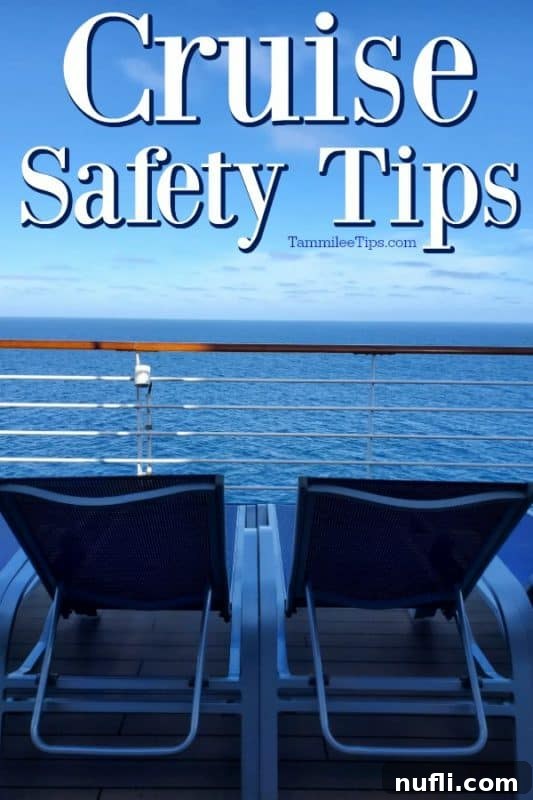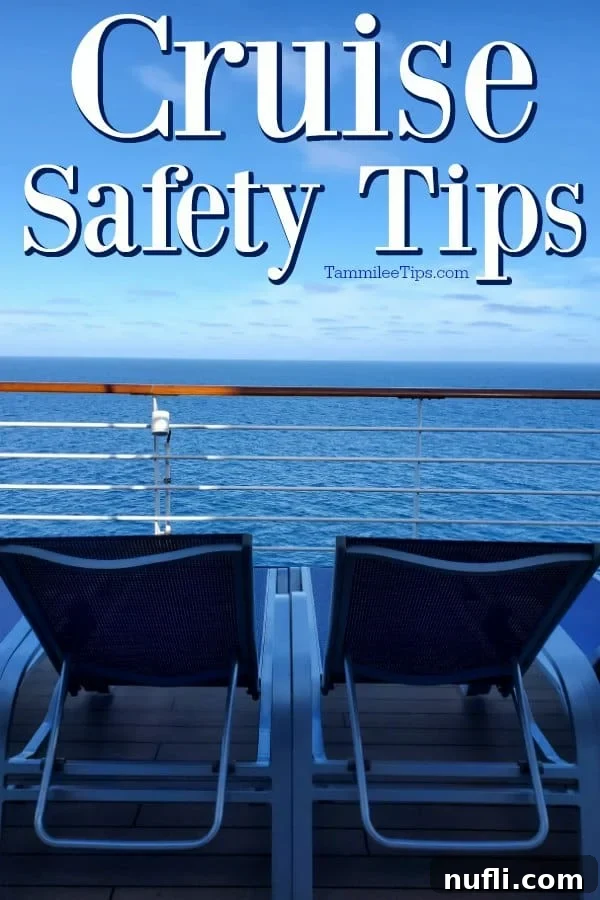Embarking on a cruise vacation promises sun-drenched days, thrilling excursions, and unforgettable memories. It’s an escape where the biggest decision might be choosing between a poolside lounge chair or an adventurous shore excursion. While cruise lines prioritize passenger well-being and safety, a truly worry-free journey begins with being prepared. By keeping a few essential **cruise travel safety tips** in mind, you can enhance your security, protect your valuables, and focus entirely on soaking up every moment of your adventure.

Planning Your Trip? Essential Resources:
🏨 Find the Best Hotels and Vacation Rentals
📍 Discover Exciting Tours and Activities
Comprehensive Cruise Travel Safety Tips for a Secure Voyage
Having embarked on numerous cruises ourselves, we can attest that a little vigilance goes a long way in ensuring a smooth and enjoyable trip. While incidents are rare, being proactive about your **cruise safety** can prevent potential inconveniences and allow you to fully immerse yourself in the experience. These tips are designed to give you peace of mind, covering everything from the privacy of your cabin to exploring bustling port cities.
Safeguarding Your Sanctuary: In Your Cabin
Your cruise cabin serves as your personal sanctuary at sea, offering comfort and privacy. However, it’s essential to remember that numerous crew members have access to these spaces for various duties, such as cleaning, maintenance, and supervision. While the vast majority are trustworthy professionals, exercising caution is always prudent.
- Utilize Your In-Cabin Safe: This is arguably the most critical piece of advice for **cabin safety**. Before you even unpack, locate and understand how to use your cabin’s safe. It is the designated secure location for your most valuable possessions. Lock away your passport, extra credit cards, significant amounts of cash, expensive jewelry, and any crucial identification documents when you don’t need them. Even seemingly innocuous items like your birth date and full name can be starting points for identity theft, so keep personal documents secure.
- Secure Your Door: Always ensure your cabin door is securely closed and locked when you leave, and even when you are inside. Most cruise cabin doors have both a main lock and a secondary deadbolt or chain lock. Get into the habit of using both, especially at night or when you’re simply relaxing in the room. If someone claims to be crew and you’re unsure, ask for their identification or call guest services to verify before opening your door.
- Balcony Door Precautions: If you have a balcony, always keep the door locked when you are not actively using it, especially at night or when leaving the cabin. This prevents unauthorized access from adjacent balconies and eliminates the (albeit rare) risk of accidentally falling overboard in rough seas or while sleeping.
- Minimize Visible Valuables: Avoid leaving expensive electronics, jewelry, or cash openly displayed in your cabin. Even if the door is locked, a quick glance through an open door by a passerby could flag your cabin as a potential target. Keep items tucked away and out of sight when not in use.
- Know Your Muster Station: While not directly about protecting valuables, knowing the location of your muster station (emergency assembly point) and the location of life vests in your cabin is a fundamental safety practice that should be understood as soon as you board.
Staying Alert at Sea: On the Ship
The ship itself is a vibrant community, bustling with fellow passengers eager to enjoy their vacation. The atmosphere is generally festive and friendly, but it’s important to maintain a healthy level of awareness. Crowded common areas, bars, casinos, and entertainment venues can sometimes attract individuals with less-than-honorable intentions, particularly when it comes to opportunistic theft or identity fraud.
- Maintain Situational Awareness: In busy areas like the buffet, casino, or theater, keep an eye on your belongings. Purses, backpacks, and mobile devices left unattended for even a few seconds can be easy targets. Consider using an anti-theft bag with hidden zippers or slash-proof material for added security.
- Guard Your Personal Belongings: Never leave your phone, wallet, or purse on a table or chair while you step away, even if it’s “just for a second.” Pickpocketing can occur quickly and discreetly in crowded spaces. Keep your wallet in a front pocket or a secure, cross-body bag.
- Responsible Alcohol Consumption: While enjoying the ship’s bars and lounges is part of the fun, consuming alcohol responsibly is key to your **onboard safety**. Impaired judgment can make you more vulnerable to theft, accidents, or becoming disoriented. Always know your limits.
- Be Cautious About Sharing Information: It’s wonderful to meet new people and make friends on a cruise, but exercise discretion when sharing personal details. Avoid discussing your cabin number, specific travel plans, or financial information with strangers.
- Think Before Connecting Online: Be wary of requests to connect on social media or exchange contact information with new acquaintances too quickly. You have limited knowledge about these individuals, and sharing sensitive information or even just your online presence could have unintended consequences.
- Children’s Safety: If you’re traveling with children, establish clear rules and meeting points. Consider using wristbands with your contact information for younger kids. Supervise them closely, especially around pools, hot tubs, and crowded areas. Familiarize them with ship security personnel.
- Attend the Muster Drill: This mandatory emergency drill is not just a formality. Pay close attention to the instructions for using life jackets and navigating to your muster station. Understanding emergency procedures is paramount for everyone’s **cruise ship safety**.
- Health and Medical Facilities: Familiarize yourself with the ship’s medical center location and hours of operation. Consider purchasing travel insurance that includes medical coverage for cruise travel, as onboard medical services can be expensive and your regular insurance might not cover international incidents at sea.
Exploring with Confidence: At Port
Stepping off the ship and into an unfamiliar port can be an exciting part of your cruise adventure. However, leaving the controlled environment of the vessel means entering a new territory where different norms and potential risks apply. Distracted tourists can often become targets for petty theft or scams.
- Research Your Port of Call: Before arriving, do a quick search about the port city. Understand local customs, identify safe neighborhoods, and be aware of any areas best avoided. Knowing common tourist scams in advance can also save you trouble.
- Carry Only Essentials: When disembarking, leave your passport, extra credit cards, and large sums of cash in your cabin safe. Carry only a copy of your passport or ID, one credit card for emergencies, and a small amount of local currency for purchases. This minimizes your losses if your wallet is lost or stolen.
- Protect Against Pickpockets: Keep your money and valuables in front pockets, a secure money belt, or a cross-body bag worn in front of you. Avoid carrying wallets in back pockets or open-top bags. Be especially vigilant in crowded markets, tourist attractions, and public transportation.
- Mind Your Belongings at All Times: Never set your bag, camera, or phone down on a table, chair, or floor while you are distracted, for instance, taking pictures, reading a map, or dining. It’s surprisingly easy for items to “disappear” in plain sight.
- Avoid Debit Card Use: For purchases ashore, use a credit card instead of a debit card. Credit cards offer better fraud protection and are not directly linked to your bank account, thus protecting your funds more effectively in case of unauthorized use.
- Discreet Shopping: If you make purchases, avoid flaunting them while walking through town. Keep your shopping bags discreetly carried or tucked away. Drawing attention to new, potentially expensive items could make you a target for thieves. Save the “show and tell” for when you’re safely back in your cabin.
- Choose Reputable Transportation: When hiring taxis or local guides, use official, licensed services. Always negotiate the fare before getting into a taxi, or ensure the meter is used. Avoid unsolicited offers for rides or tours from individuals on the street.
- Stay in Groups: If possible, explore ports with a companion or group. There is safety in numbers, and you can look out for each other.
- Know the “All Aboard” Time: Always keep track of the ship’s departure time from port. Being left behind means significant expense and hassle to rejoin your cruise. Set a watch or phone alarm as a reminder to head back to the ship well in advance.
General Cruise Safety Practices for Peace of Mind
Beyond specific locations, some overarching safety principles apply throughout your cruise journey, ensuring a holistic approach to your well-being.
- Invest in Travel Insurance: This is a non-negotiable recommendation for any cruise. Comprehensive travel insurance should cover medical emergencies (including evacuation), trip cancellation/interruption, and lost luggage. Standard health insurance may not cover you outside your home country or at sea.
- Stay Connected (Smartly): Understand your options for communication. While ship Wi-Fi packages can be expensive, they offer a way to check in. For port days, consider an international roaming plan or a local SIM card if staying for a longer period. Always have emergency contact numbers programmed into your phone and possibly written down as well.
- Prioritize Your Health: Practice good hygiene, especially frequent hand washing or sanitizing, to prevent the spread of illness in close quarters. Stay hydrated, wear sunscreen, and take breaks from the sun to prevent heatstroke or sunburn.
- Trust Your Instincts: If a situation or person makes you feel uncomfortable, remove yourself from it. Your gut feeling is a powerful safety tool.
- Report Suspicious Activity: If you observe anything unusual, suspicious, or feel unsafe, immediately report it to ship security or a trusted crew member. Cruise lines have dedicated security teams trained to handle various situations.
By integrating these comprehensive **cruise travel safety tips** into your vacation planning and daily routine, you can effectively minimize risks and maximize your enjoyment. A cruise should be about relaxation and discovery, not worry. So, prepare wisely, stay aware, and set sail with confidence for an incredible, secure adventure at sea!
Explore More Cruise Travel Guides and Tips
Carnival Cruise Vacation Tips
Costa Maya Cruise Port Guide
7-Day Mexico Cruise from Long Beach
Carnival Cruise App Guide
Best Things to Do in Curacao on a Cruise
Check out all of our Comprehensive Cruise Travel Guides
